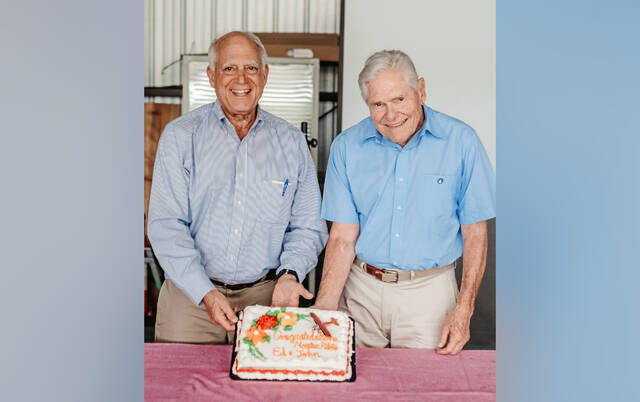https://mirror.triblive.com/local/westmoreland/skys-the-limit-2-flying-club-members-receive-wright-brothers-awards-for-50-years-of-flight/
‘Sky’s the limit’: 2 flying club members receive Wright Brothers awards for 50 years of flight

Ever since they were children, John Dyke and Ed Patrick have been fascinated by airplanes.
“I could spend hours on the observation deck watching planes take off and land,” said Dyke, 75, of Carnegie.
For Patrick, 81, of Murrysville, the first ride he took in a smaller plane was the time he went skydiving as an engineering student at the University of Pittsburgh in the early 1960s.
“(It was) a number of years (after), actually, before I got to land in a small airplane,” he said.
Patrick got his pilot’s license in 1977 after he started flying in 1966 and took a 10-year hiatus while he was into boating.
But once he got back into it, he’s been flying ever since.
While Dyke was working for his family’s business in Mt. Lebanon around 1973, he was with a salesman when they passed a “learn to fly for $5” sign.
“I was just hooked,” Dyke said. “I started taking flying lessons to get my private license, then I continued to get my commercial license.”
Now, both Dyke and Patrick have completed 50 or more consecutive years of safe flight operations — earning the Wright Brothers Master Pilot Award.
The award is the most prestigious one that the Federal Aviation Administration issues to pilots certified under Title 14 of the Code of Federal Regulations Part 61. It’s named after the Wright brothers, the first American pilots.
Dyke and Patrick were presented with their awards during a ceremony at the Pittsburgh Flying Club hangar at the Arnold Palmer Regional Airport in Unity. Both weren’t aware the award existed initially.
Now, they each will get their information added to a published Roll of Honor online with other master pilots.
“I think it’s a milestone — one that I had never expected and never even thought about,” Patrick said. “It kind of forces you to look back. … (I) had to go back through my log books. I had notes about … things that I had totally forgotten.”
It was like a trip through history, Patrick said.
In the 1970s, Patrick said he belonged to the Monroeville Flying Club, which he said is the least expensive route for anyone interested in becoming a pilot.
As a nonprofit, the Pittsburgh Flying Club, which Patrick and Dyke are now a part of, has one airplane that’s shared among the club’s 19 pilots.
“It’s really very expensive to fly … unless you have a lot of excess money to burn,” Patrick said.
Four or five of the pilots are instructors, Patrick said, with a variety of commercial and military flying experience.
“That sharing of knowledge really helps us a lot as individuals,” Patrick said.
Patrick said he and Dyke fly a lot together, oftentimes just to get lunch in Maryland or at Penn State.
“It gives me a lot of gratitude that I am able to (fly) at this age of my life … and to appreciate friendships that I have with a lot of people in aviation,” Dyke said.
He said he can’t believe he’s been flying for 50 years.
“Time just sort of catches up to you,” Dyke said.
In 1979, Dyke bought a Piper Arrow plane and started flying “all over the country.”
“(I) just felt at home in the plane,” Dyke said. “Maybe in my other life I was a bird or eagle or something.”
He traded the plane in for a Saratoga with a friend in 1981.
However, as Dyke’s children got older, he needed money to pay for their college tuition, so his partner bought him out. He didn’t fly much for a couple of years, he said.
After they graduated, Dyke decided to join the flying club.
“If you fly, there’s just something about it that’s just really amazing — to be dancing with the clouds,” Dyke said.
Patrick said he’s been taking his grandkids flying every chance he gets.
“I think you have to keep active and keep doing stuff and keep learning,” Patrick said. “When you stop learning, I think the game is over.”
For Patrick, flying is something he looks forward to.
The freedom of flight and view in the air is “priceless,” Dyke said.“The sky’s the limit.”
Copyright ©2026— Trib Total Media, LLC (TribLIVE.com)
